How to Happygolf Your Life
My husband, Dana Janssen, shared lessons from the worst year of our lives. Learn more about what “happygolf” means and how to apply it to your life.

My husband, Dana Janssen, was the Keynote speaker for the 2017 University of Alberta School of Business Graduation Banquet. He gave the speech on April 1, 2017, and did an amazing job. It provided his reflection and learnings from both the hardest day and year of our lives. I have been thinking about his speech a lot over the last few weeks and thought I would share his takeaways as well as my perspective as his wife and partner.
Some context
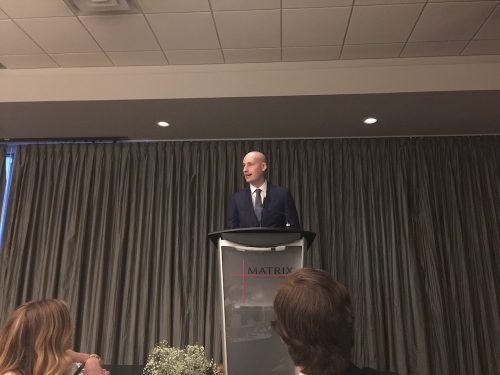
Dana was asked to share his story with the new grads but not given any other direction. He graduated from the University of Alberta School of Business in 2007 and had already started our first business, AgileStyle, during his last year of school.
Over the last 10 years, we have gone through many different ups and downs both personally and professionally. There were several directions he could have taken the speech. In the end, Dana told the grads that he wasn’t there to give them the usual inspirational “be bold and go forth” type of graduation speech, or the TedTalk style where they would get their minds blown. Rather, he wanted to share with them the things he learned from when he was what he called, “waist-deep in it”.
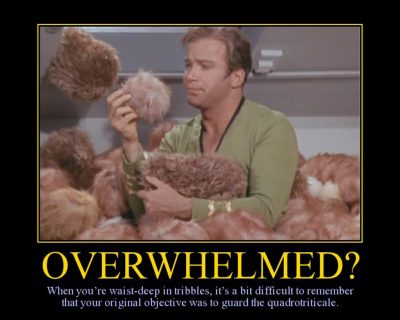
I loved this approach. There were all these fresh-faced kids (they made me feel so old, lol) who are just at the beginning of their journey into adulthood. Most have likely not had a ton of hardship in their lives and have been very fortunate to be university-educated. Many of them don’t yet even know what being waist-deep in it actually means.
Dana took the absolute worst thing that had ever happened to him (and us) and shared it in a humble, funny, but impactful way. I hope it will stick with at least a few of them because I know it has stuck with me. I like to think that sharing some of the positive things we learned from that time is one of the gifts we get to give for having gone through it. Here’s one.
Story 1: The Worst Day
Part 1: It started with a mix-up
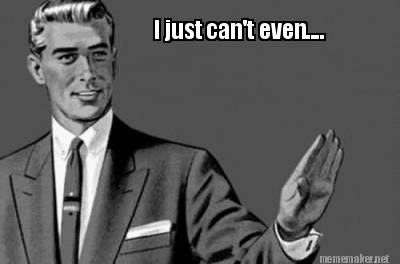
Dana had an early appointment on Friday, September 14, 2012. We thought it was just a normal follow-up (after a few weeks of different appointments) so he went to it on his own (one of my biggest life regrets).
He sat in the usual examination room with crinkly paper over the table, a couple of hard chairs, and cartoons telling you to wash your hands. A med student came in and started telling him about his treatment plan and he had to stop her because he wasn’t sure what she was talking about.
She looked at him in confusion and asked, “Hasn’t anybody told you?.” Seemingly unprepared to give the news, she said the words no one wants to hear: “You have cancer.” This left them both pretty shocked, but she soldiered on and finished her spiel about his treatment plan…which had unsurprisingly turned into white noise for Dana. When she finished, unsure of how to handle the situation further, she left the room to get the oncologist.
“Hasn’t anybody told you?...You have cancer..."
Backing up, this actually started with a long car-ride in mid-July 2012. We drove to and from Calgary for an event and Dana’s leg was bothering him. There was a lump at the top of his calf muscle so he went to get it checked out.
After a few weeks of escalating scans, ending in a biopsy, it turned out he had an Ewing’s Sarcoma. This is a rare cancer most commonly found in children – he was 28. This was normally a bone cancer – he had it in his right calf muscle. Because so few adults get this cancer, they essentially follow the same treatment regimen as children. There are also very few studies on outcomes. All we knew was that his odds were much higher because it hadn’t spread. He was in for a long road, but his circumstances were about as good as they could be.
Dana was given all this information. Stunned, he paced the small room while he waited for the oncologist. Repeating 3 long strides before turning and coming back, each length he wondered, “What am I going to do?” Turn. “Am I going to die?” Turn. “What am I going to do?” Turn. After an indeterminable amount of time, he realized that he already had been given a plan, he just had to follow it.
He made a decision: it would be like any other project he managed. He would show up on time, do what the doctors told him to do, and do it with a smile on his face. He was given a map, and it was up to him to follow it. He would be a professional cancer patient.
This was the basic plan:
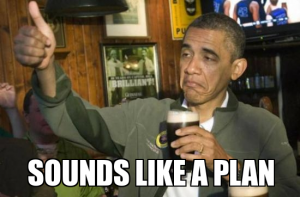
- A total of 17 chemo treatments, every 3 weeks for 13 months.
- 28 days (in a row) of radiation.
- Surgery to remove the tumor.
When the oncologist came in he told her he was ready to get started, and it was going to be great. She looked at him like he was crazy. But he had made a decision to take control of the one thing he could in this situation: His attitude.
Part 2: Happygolf
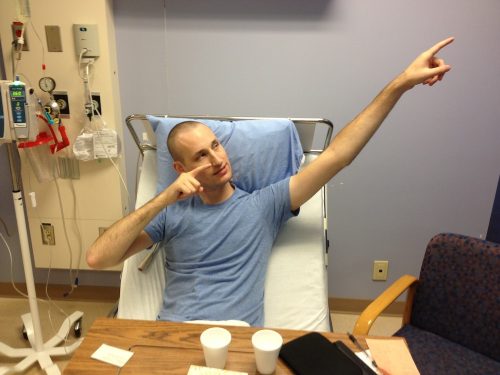
Dana talked about how having a plan helped a lot. As he was putting his speech together and sharing pieces with me, I made a quip that he had “happygolfed” his treatment. This comes from a Janssen family joke via Dana’s mom.
Many years ago she told my father-in-law, after a particularly bad run on the golf course (as in slamming clubs and spewing expletives), that he should happygolf… and you can imagine how well that went over. My father-in-law said that divorce was a near thing in that moment, :P.
Now, I am not a golfer, but I can understand when you are fuming mad and frustrated, having someone tell you to just be happy makes you want to commit a crime. It’s kind of like having someone tell you to calm down when you are upset. It likely does the opposite of what’s intended. BUT as Dana reflected on how he approached his treatment, he realized he actually understood where his mom was coming from.
He would go through all the chemo, radiation and surgeries listed above. He would also spend 76 days of 13 months hospitalized, have 2 blood transfusions, and visit the emergency room 4 times. Not everything went according to “the plan” but Dana CHOSE to be positive and make the best of a crappy situation. He happygolfed his cancer treatment. Now, it is how he approaches his life.
The Takeaway: You can make the choice to happygolf your life
The first thing that Dana told the students was,
“You have the greatest impact on your own experience”.
Life will throw hard things your way and you don’t likely have much control over them, but you do have control over how you handle them. You will get upset, you will cry and rage and be angry or sad. When the dust settles, you decide if you are going to be miserable all the time or if you are going to make the best out of the situation and happygolf that shit.
My Reflection
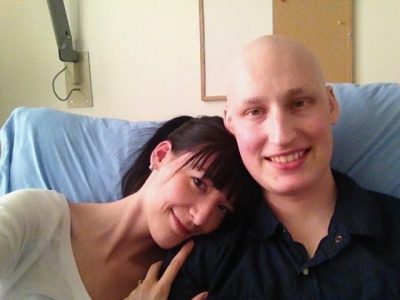
In the same way that Dana made the decision to be a professional cancer patient, I made the decision that it was my job to a professional caregiver. I decided I would do everything in my power to make his job as easy as possible.
I memorized the name of every chemo drug and medication he was taking and when he had to take it. I carried the emergency room letter that got us past the waiting room with us everywhere. After our first emergency room visit, I pre-packed a bag to take with us so we would be ready. I knew when every appointment was and took notes so we didn’t miss anything. I made him check his temperature a million times when he was at risk for neutropenia (which resulted in the emergency room visits). I bought all the supplies to take care of his surgery/radiation sites. I kept a close eye on him at the few outings we did attend to watch his energy levels and make sure he didn’t over-do it. I took care of the business and our staff as best I could. I even found our first office space and arranged the move from our house so Dana could get his home back. I did what anyone would have done when the person they love the most was sick.
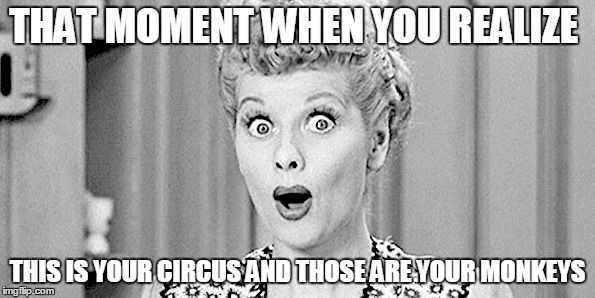
I don’t know that I can honestly say that I happygolfed like Dana did over that time. For me, it was more a time of constant vigilance. I went from task to task, trying to make sure things were taken care of so that Dana didn’t have to worry about them.
As someone who likes to plan everything, dealing with a long stretch of uncertainty (with a large side of control-freak), this was all I could really do. I did my best to be positive and the best support I could be for him. But truthfully, there was an undercurrent of fear that would sneak out when I was really tired or alone with my thoughts. Those were the moments where I didn’t keep it together, where I felt sorry for him and for myself, and I couldn’t bring myself to happygolf. Those were the moments where I cried in the bathroom. But, I would eventually pull it back together, take a deep breath, and remember that I had a very important job to do.
The takeaway that I learned is similar to Dana’s, but with an asterisk. It is that you get to choose how you act, how you handle hard things and even happygolf your life. But it is ok if you break down, if you cry and rage and have moments where you just can’t.
To me, the true test of happygolf is how fast you can come back from those low points, dust yourself off, and get back at it.
The gift of perspective
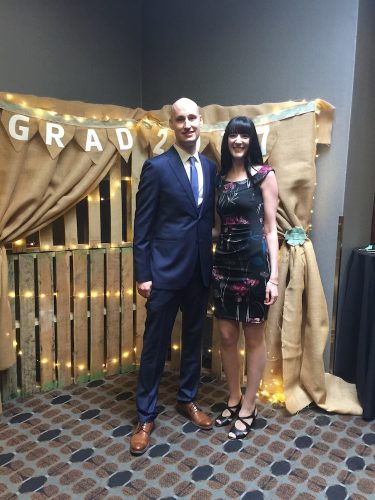
Perspective is the gift of going through something terrible and coming out on the other side. I came out of that time much better at the happygolf approach to life. I can look at a hard thing and compare it to that time, and be grateful that it isn’t THAT. Most hard things pale in comparison to being told that the person you love most in the world has cancer and could die, (and all the things that followed for the 13 months after). I can look at my life through a different lens and appreciate how truly fortunate we are. We have an awesome life and I am grateful for it every day.
My approach now, and one I hope you will consider, is one of giving myself permission to have negative emotions because I don’t think you can necessarily control that, but instead controlling what I do with them. I try to let them go as fast as I can by thinking about where they are coming from and how they impact those around me. I learned first hand that things can change very quickly.
I still get upset, I still complain, I still have days where I am cranky, but I work hard to get over myself faster each time I realize where my headspace is. I try to have as few of those break-down moments as I can because you never know what is coming around the corner. I choose to happygolf as much as possible. And, as was the lesson from Dana’s talk to those students, I hope you don’t have to have something serious happen in your life to encourage you to happygolf.
Part of the purpose of Dana’s talk was to give those students the gift of his experience so that they do not have to go through something like we did to learn to happygolf their lives. I wanted to share my reflection because it is easy to say but much harder to do. I am still working on it, even after all that. It takes practice, permission, being kind to yourself when things are hard, and forgiving yourself for not being perfect.
Summary
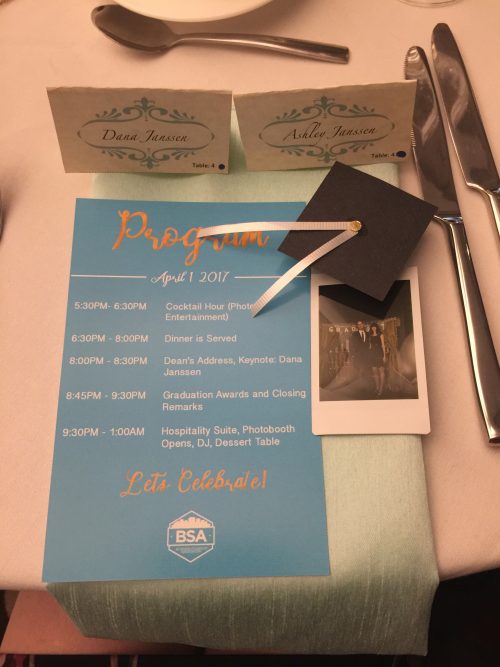
It has been almost 4 years since Dana finished treatment. He goes for regular scans and so far everything is clear. We have had the normal ups and downs of life over the last few years but mostly ups. We have wonderful families and friends, we have a lovely home with our cats, our business is doing well, and most important of all, we have each other.
As Dana shared this first story with those students, I sat there as memories flashed through my brain. I was just so proud of him. He really did take a terrible situation and make the decision to make the best of it. He was unfailingly positive and upbeat, even when I know he felt awful. Even at his worst, if you asked him how he was he would tell you, “Excellent!”, and mean it. I hope we never have to do anything like that again, but I will take the lesson from that time:
I can choose how I react and handle things when life throws me curveball. I choose to happygolf.
Check out my follow-up post: How to Find and Partner with the Right People: A Venn Diagram for Life
Share
Ashley Janssen

Productivity consultant, writer, speaker, serial entrepreneur, chaos calmer, introvert, cat-lady. Lover of books, fitness, old fashioned’s, basketball, and video games.
Follow me on
Twitter
or
LinkedIn.
Hire me for
1 on 1 productivity consulting
or
speaking.
Related articles

What It Really Means To Be Calm
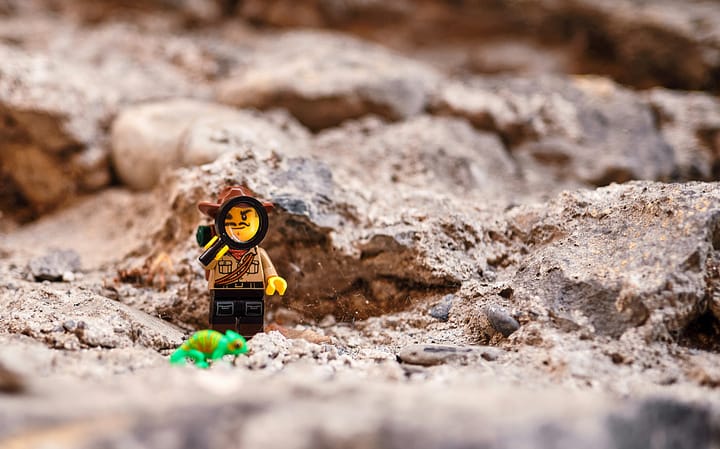
Discovering The Right Way to Live


Comments ()